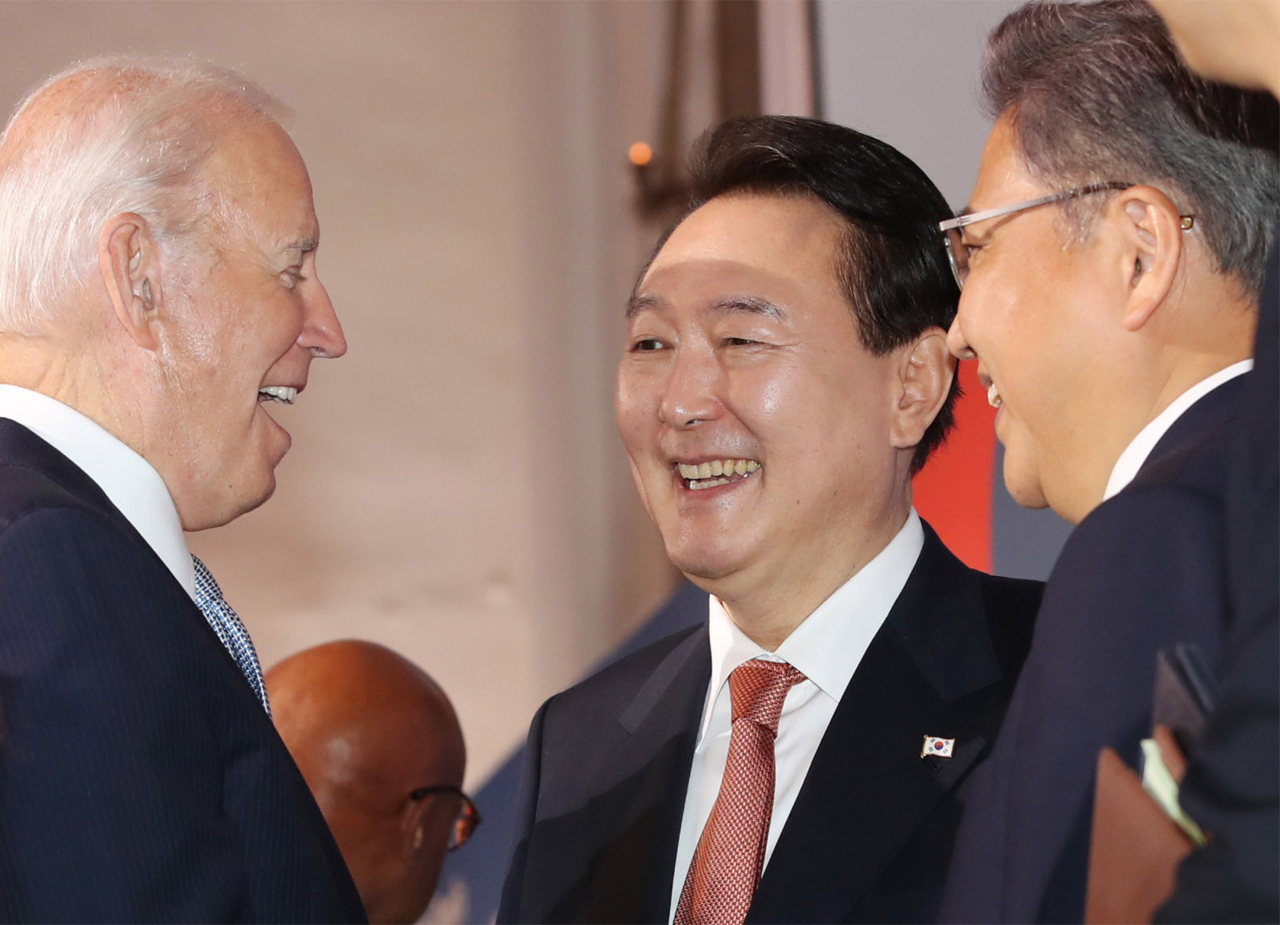
The controversy surrounding President Yoon Suk-yeol's possible use of vulgar language during his recent US trip continues, despite numerous attempts from the presidential office and the ruling party to downplay the issue.
While the ruling and opposition blocs clash head on, the Yoon administration has put the blame on local media, saying that “untrue” reports could damage South Korea’s alliance with the US and put people “at risk.” However, experts say the media should play its role even if reports do so.
When the controversy first erupted, the presidential office focused on avoiding offending US entities. The first statement released by the office was that Yoon’s vulgar language was not targeted at US Congress, but Korean lawmakers.
During his first in-office interview after the overseas trip on Monday morning, Yoon said: “Damaging the alliance (with the US) with reports that are different from the facts is putting the people at risk.” The US is South Korea's most important security and economic ally.
The next day, Lee Jae-myung, deputy spokesman for the presidential office, also said in a local radio interview: "The essence of the problem (that we deem serious) is (an attempt) to denigrate an ally, not just the use of slang."
A high-ranking official told reporters on Monday that they had explained to a high-ranking White House National Security Council official that the media reports on President Yoon's remarks were not about the US.
"The NSC responded that it was well understood and there was no problem," the official said.
The ruling People Power Party said it would take legal action against local broadcaster MBC, which first reported Yoon’s remarks, saying MBC damaged “national interest.”
Experts say, however, that the media should continue to play its role.
“Now (is the time) that everything can be revealed -- transparent and wise communication has become the royal road,” said Shin Ho-chang, a professor at Sogang University’s communication college.
In the past, even leading media in advanced countries avoided reporting that damaged national interests. And to some extent, journalists around the world agreed, Shin said. But this became impossible after China's Tiananmen Square protests and the ensuing massacre in 1989 and after the Iraq-Kuwait War in the early 1990s. He added that these nations were humiliated because of the misinformation disseminated by the press intended to protect the national interest.
“If the Korean media now speaks or distorts an issue under the pretext of national interest, it will lose credibility at home and abroad,” the professor said, adding that while trust in the government can be restored with the next administration, it will not be easy to restore trust in the Korean media. “The media is the last bastion of national interest and national dignity,” he said.
Another communications professor, Kim Kyun-soo at Chonnam National University, shared Shin’s view.
“I think the media has done what it has to do, which is monitoring public matters, including the president,” Kim said, and agreed that the presidential office mishandled the matter.
“The response and confusing messages from the presidential office afterward raises doubts about its ability to manage this crisis,” he said, referring to the presidential office and the ruling party's denial of the incident and lashing out at media.
Kang Youn-gon, a professor at School of Media and Communication at Chung-Ang University, questioned whether the reports violated national interest.
“There is no reason for the media not to report what the most important news source says,” Kang said. "Also, it is necessary to examine whether there is sufficient evidence for the claim that such reports violate the national interest.”
Multiple media advocacy associations staged protests and released statements on Tuesday, criticizing the presidential office and the ruling party for blaming the media as the source of the controversy.
Six media groups held a joint press conference outside the presidential office on Tuesday.
"What harms the national interest is the president's harsh remarks that stick out like a rugby ball at any time and place, not the media reporting it,” a joint statement read.
Park Soo-hyun, a former senior presidential secretary for public relations under the Moon Jae-in administration, said: "If President Yoon Suk-yeol apologizes, all problems will be solved, but the situation is getting bigger as he continues to explain and not apologize."
"Whether it is Biden, the US Congress or the Korean National Assembly, the essence was his use of slang," he said, calling for Yoon's apology.
Some critics say the South Korean media went too far by spreading the video of Yoon before the press embargo was lifted.
Kim Geun-sik, a professor at Kyungnam University who worked on Yoon’s election campaign, said that there are suspicions that the main opposition Democratic Party of Korea and some media intentionally spread President Yoon’s remarks in New York to besmirch the president.
“The video of the controversy became a fait accompli … damaging the Korea-US relationship an instant before the embargo was lifted,” Kim said. “It is basic journalistic ethics for the video to have been sent to the president's office after the release of the embargo.”





